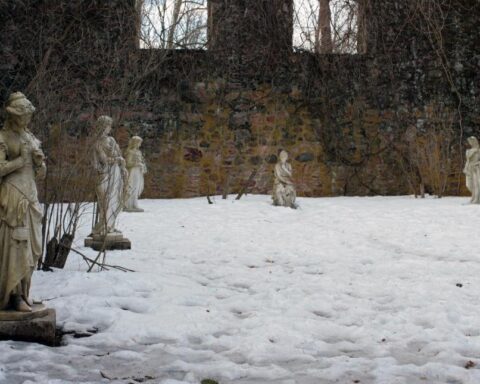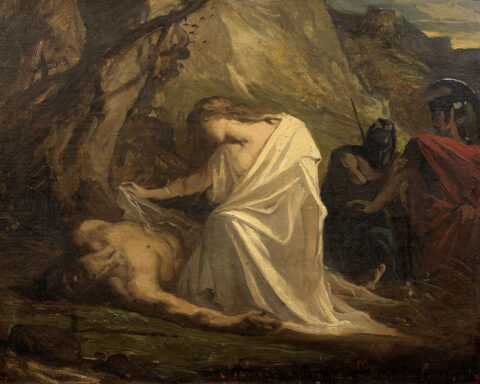The summer I was seventeen I wanted to see Paris because my heart had been broken by a girl who sat beside me in our hayloft and told me she could never love me and I could never love her even though her knees were smooth and pale and shone in the light that seeped through the barnboard cracks and fell like prison bars as she spoke. There is no cure for a broken heart before a person reaches the age of twenty.
Instead, my father thought I needed a taste of an ancestry I didn’t want to have so he sent me to visit my bitter aunt Gerta who lived in Oldenburg and who remembered her life as a portrait of hardship. Her life lay the ruins where the last thing on anyone’s mind was the wasteful emotion of love.
I couldn’t stand the silence as we sat with teacups in front of us. I cannot drink tea.
“Everything is very old here,” I said.
“Everything is old,” my aunt replied and swallowed hard. She didn’t want me there. She needed to be alone with memories she was trying to forget.
“What was it like when you were seventeen?” I asked. I was trying to make small talk. Sympathy was the last thing I wanted to feel for her.
“Did you fall in love?”
“He was killed. Everyone was killed. It was madness. When you are starving there are better things to think of than love,” she said and tapped her finger on the one relic she had preserved from her old life of waltzes and mystical romanticism a copy of the poems of Novalis. “I wanted to dream and it was against the law,” she said and turned away from me to face the sitting room’s lace curtains.
Although I was her house guest, and it was difficult. I hadn’t noticed the shadow of the light as it passed through the lace curtains. She had a swallow on her cheek. Its beak was pointed down. The bird was in a swoon, a nose dive as if it had fallen from the sky. I told her I need to go out and buy cigarettes. I don’t smoke. I just wanted to stand in the street and stare at people walking by – the old men in frayed suits who frowned at me for loitering, the mothers dragging their children to and from the small market on the corner, and the lorry drivers in black leather jackets who glared at me for doing nothing. When I returned she would smell me and call me a liar. She was, she said, familiar with the smell of smoke.
I had to give my parents updates on my activities. I told them I had visited the castle, that I had strolled along the Westfalendamm and spent an afternoon in the Landesmuseum of Nature and Humankind and wondered where kindness and human nature had gone when my aunt and my grandparents had been mesmerized and driven to madness.
My aunt caught me reading her book of Novalis’s poetry. She had tucked it behind a repaired porcelain figurine of a girl eating a pink dessert from a golden spoon. She snatched the volume away from me. But she was too late. Though I could barely tell what the poet was saying, I knew enough German to understand he had buried the trees and the rivers and all the things that just happen as they do on our farm beneath layers of speculation and trembling. His heart was in nature. It was soaring in the sky until it ran out of breath.
It must be easy for people to love something so much they overlook what they love for how they love it. Such fervor forgets the simplicity of birds flying in and out a hayloft door. The madness to feel more until everything goes numb entangles their chirps until they lose their voices. Human beings are nothing greater than what they are. The mind doesn’t have wings. The body has feet. That was my way of explaining the history of my family. I couldn’t stop thinking of the birds on Gerta’s curtains.
Gail, the girl I wanted to love, came to see me the day before I departed. I was alone in the hayloft with the barn swallows and I broke open bales of the first hay load we’d laid in before I left for Oldenburg. Gail was sauntering along the road. She probably wanted to see if my heart was still broken and may have wondered if I had decided I would run away from my aunt and see Paris and find love on the other side of a bridge over the Seine.
“There’s a bridge covered in locks. Each lock represents a promise. The lovers pledge themselves to each other and then toss the keys into the Seine.”
“What good does that do?” I asked. “Someday someone is going to come along and cut them all off with a hacksaw. Besides, it will make my parents happy if I see Oldenburg.”
Gail wanted me to reconcile why I wanted to go to a place where such evil things had happened. Maybe she was expecting me to tell her responsibility, hard work, and all the painful duties imposed on a person by the ‘authorities.’. She could then bid me farewell knowing I had given in to a darkness in my nature.
Her father and grandfather had fought the Germans. In her family, even though I was born in America, I was still the enemy who spoke the enemy’s language to my parents. And I knew she would look at me pathetically and wonder why I wasn’t planning to go to Paris when I was so close. I could hear her voice ask, “Why don’t you simply hop a train? I thought Paris was a big deal for people like you.”
“Like what?” I asked.
“You know,” she said.
As she came up the lane a few minutes before she found me in the loft, I heard my mother telling her I was leaving the next day and had no time for her. A few moments later she was standing in the sliding door, looking around the stalls of milkers and wandering up and down between the stalls before she saw me and climbed the ladder. I was seated on an unopened bail. She didn’t say anything but lifted my right hand and placed a lock in it.
“What’s this for?” I said.
I didn’t want to say hello or ask how she was because she’d told me that a week before she and Boone were an item now and no matter how hard I tried there was nothing I could say to her to make her change her mind. So I said nothing.
“That’s the for the bridge where you are going.”
“What bridge? The ones in Oldenburg don’t have anything to do with locks.”
“No,” she said. “The one that crosses the Seine.”
“I suppose you have the key,” I said because I could see it around her neck.
“I have two keys. One for you to throw in the river and one for me should I decide to unlock it.”
“Boone isn’t enough for you?” I asked.
“I am thinking about promises. Boone is someone who may have a future, but in case his future fails I want another one locked in place.”
“What about me? This sounds like a binding contract.”
“You should become a lawyer if you ever return,” she said, patting her key.
It rested against her neck but had popped out between the second and third buttons of her shirt. Maybe she had intended it to be revealed, an enticement, a low-hanging fruit like an apple I’d seen Eve handing to Adam in a painting when I was reading a museum guidebook for things to see in Oldenburg.
I saw the painting one afternoon. My aunt insisted I traipse around with the girl from the flat on the top floor who was four or five years older than me. The girl’s name was Nikki. Nikki pointed to the painting of the naked pair in paradise, standing there without fig leaves on, Eve extending the apple, and Adam receiving it from her as the animals looked on in horror.
“That’s all there is to it,” Nikki said. “He just takes the fruit when it is offered to him. He doesn’t have to do any of the work. That’s the sad part. Work is what makes a future. I don’t work. I don’t believe in futures. But look at Adam. He could do some of the work. He could ask her why he needs to taste the fruit. He doesn’t. He just stands there and waits to get poisoned by knowledge. Men are emotionally lazy.”
I didn’t think I was emotionally lazy. I just didn’t know what to talk about or what Nikki wanted to hear so I simply nodded and walked on to the next painting.”
Oldenburg is a place where they practice forgetting the past but the desired amnesia isn’t happening. In the streets, I passed dozens of Gertas. They hang a closed-lipped fear around their necks. They dye their hair black. They put studs through their eyebrows and ears. They disdain everything, especially America and in particular farms on the other side of the ocean. They say such places aren’t real. They call them cesspools of illusions. And nothing really changes. Love is supposed to heal all the wounds, but there were places on the backstreets of Oldenburg where there’d been houses and people who had lived in those places and they vanished and never returned and all because they deluded themselves into believing that the illusions of love matter more than love.
I wanted to write a letter to Gail and tell her that’s what ruined my Aunt Gerta’s generation, but the idea would have shot right over her the way swallows strafe me in the barn if they think I am too near their nest. When my aunt went out for groceries, I looked in her bedroom. There were photographs of her as a girl. She had been a Nazi. In one picture Gerta is saluting beside a boy in uniform. They have knee socks on. Their legs look pale and fragile as if they will snap at any moment from the weight being placed on them from above.
If I wrote to Gail, what was I supposed to say to her? People don’t want to know who or what they were especially when they were defined by beliefs that turned out to be not merely wrong but evil beyond anything I can’t fathom. They put themselves in pain trying to forget they loved the wrong thing, and the more they try to forget the more they remember, and I could see the hell of those memories in their eyes. They weren’t looking at me in the streets. They were looking at what I never had to own. What they live with seethes beneath the calm surface. It was their rage from which they built their world. It is the rage of having lost that world that haunts them now. It is the shadow that followed me across the platz when I went to look at the castle and decided I didn’t want to go in. It was in the tight mouth of the woman in the corner store who counted out my change when I bought chocolate. Everywhere I went, I had the feeling people hated me because I came from a world as blithe as a field of alfalfa on a June evening. The hum of crickets calling the stars to awake. The silence where only the wind mumbles to itself and a drape dances at an open window above the farmhouse porch. The willow at the edge of the property where one of the last creeks in the county still manages to flow. The chirping of swallows as the last light vanishes at the rise beyond the house.
I wanted to tell Gail how I missed home. But I would have lied to her if I had said I missed her because she was incapable of feeling ashamed, and how, one afternoon I realized I am as capable of hate as I am of love so I am destined to spend my life in the middle ground between the two. I penned a letter to Gail and told her what happened after Nikki and I left the art museum.
“I went to an art museum this afternoon with a girl who lives in the flat two floors above my aunt’s. It was all my aunt’s idea. I wanted to prove to my aunt that life isn’t about illusions, so this girl, her name is Nikki, she and I walked through a park and she pulled me into some bushes and right there, with people passing and seeing us, we had sex – I don’t call it making love – and when we finished she looked at me and asked if I knew what reality was and I couldn’t tell her. I mean, why worry about what reality is? It happens and it isn’t about to go away, so who cares?”
I didn’t tell Gail what happened later that night when I woke in the darkness and ran up the flights of stairs to where Nikki lived and I knocked on her door to tell her I knew that love was not about illusions but about the hard reality that suffers until it lies in ruins and there isn’t anything left fighting for, and instead of Nikki a guy answered the door and told me he and Nikki were busy and I should get lost. I heard her call him from another room and when she put her head out the door of the room I saw she wasn’t wearing anything.”
I finished the letter to Gail by saying I wanted to leave Oldenburg, forget the farm, and go to Paris as she suggested but not to learn how badly she had broken my heart by hooking up with Boone, but because Paris is the city of light where a person doesn’t have to be either in love or out of it. I’d read there is so much light there people’s shadows may follow them through the streets but they never catch up to them. The lights come on in the city the moment the sky begins to darken. Tourist boats ply the river and if she stood on the banks of the Seine she would hear voices describing the bridges they pass underneath. I had imagined hearing the commentaries from the boats, and if I listened hard enough I could hear keys bouncing off the glass roofs of those bateaux mouche because everyone is a fool for love and love’s illusions and all the misconceptions that blind the world yet leave the city of eternal light untouched by their pursuit of passion.
And swallows. In Oldenburg they are famous. According to mythology and a card beside a painting in the Landesmuseum, swallows are not supposed to have tongues because they represent a pain harbored in illusions of the world. Anything they could say or want to say or needs to be said hangs in a sunlit silence in an old woman’s flat because she has forgotten, or perhaps remembers too well, the pain of knowing what she should have loved and chose to ignore it.
When I reached Paris, I wrote a letter to my folks to tell them where I was and that I was safe. I never got a reply.
I visited my aunt once before she died and asked if she would leave me her lace curtains. Like a train running on time, the package containing her swallow-pattern curtains arrived exactly three days after she died, and I hung them in my window. Through them I see the city of light come alive every evening. I hung them upside down. The birds look as if they are soaring now. They are not the sad creatures of a broken world but the inhabitants of a Paris sky.
I have lived in the City of Lights for twenty years. Someday I’ll write again to my parents if they are still alive and tell them everyone in Paris is in love – a subject I have avoided for fear I might live badly with myself the figures who pass me by on the bridge of locks.



